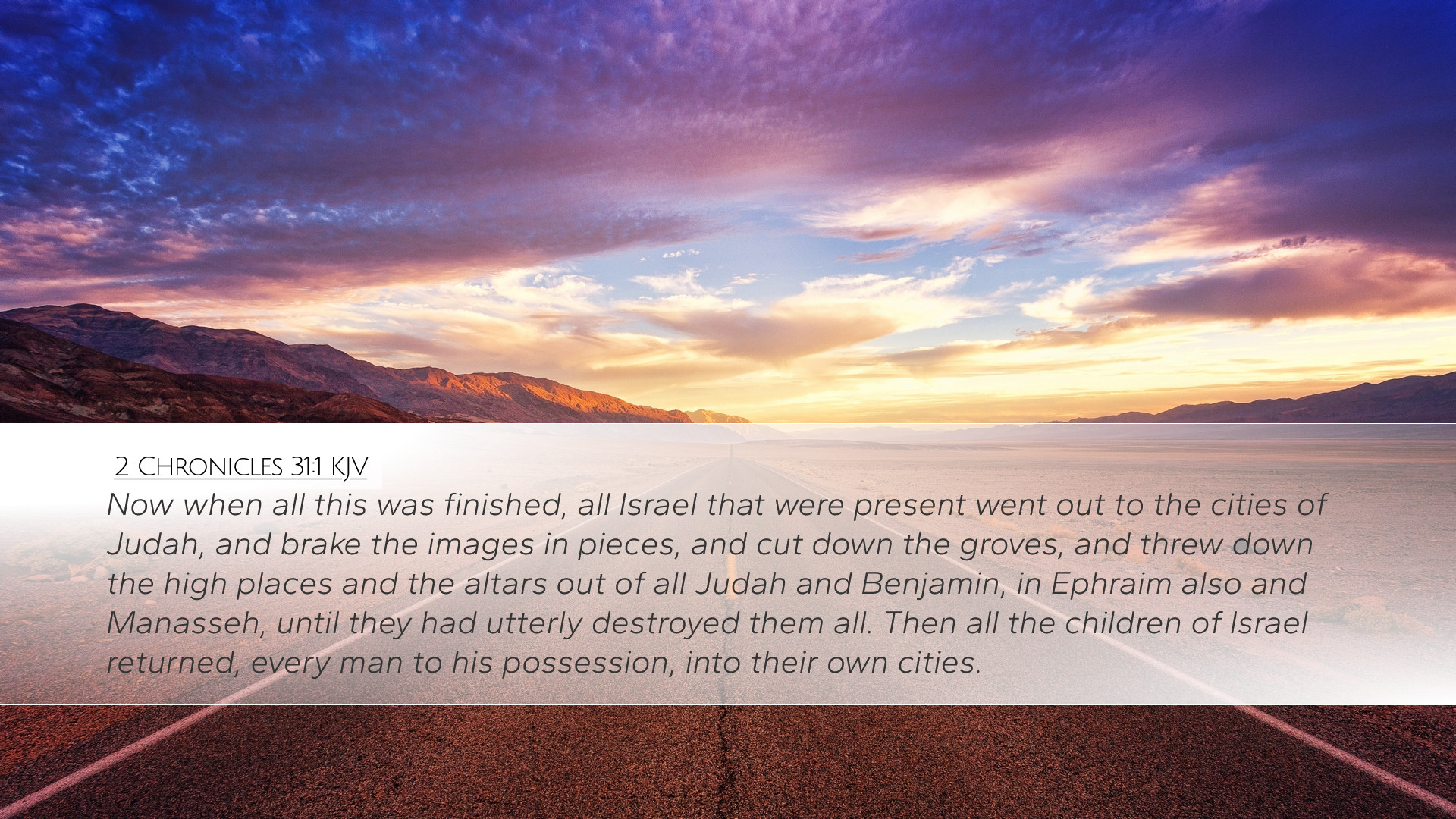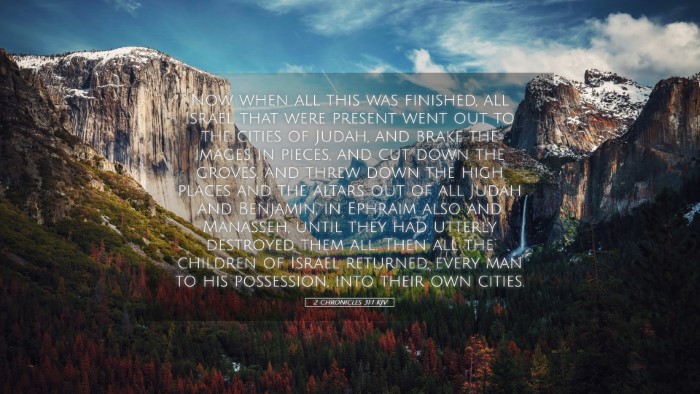Commentary on 2 Chronicles 31:1
Verse: 2 Chronicles 31:1
"Now when all this was finished, all Israel that were present went out to the cities of Judah, and brake the images in pieces, and cut down the groves, and threw down the high places and the altars out of all Judah and Benjamin, in Ephraim also and Manasseh, until they had utterly destroyed them all. Then all the children of Israel returned, every man to his possession, into their own cities."
Introduction
The passage in 2 Chronicles 31:1 marks a significant moment in the history of Judah and Israel, reflecting a collective movement towards spiritual reform and dedication to the worship of the one true God. Following King Hezekiah's restoration efforts, this event highlights the importance of purging idolatry and returning to genuine worship.
Matthew Henry's Insights
According to Matthew Henry, this verse illustrates the zeal of the Israelites in their devotion to God after the Passover and the re-establishment of proper worship practices. He emphasizes:
- The communal action taken by the people, showcasing their unity in forsaking idolatry.
- The act of breaking down images and groves signifies a radical reformation, a clear commitment to eradicate remnants of pagan worship.
- This movement illustrates the influence of leadership, as Hezekiah's reforms inspired the populace to act decisively against idolatry.
Albert Barnes' Commentary
Albert Barnes provides additional context around the significance of the actions taken by the people in this verse. He notes:
- The phrase "brake the images in pieces" indicates a coarse but necessary destruction of idols, reflecting a deep-seated disapproval of false gods.
- Cutting down the groves, often associated with pagan rituals, indicates a thorough cleansing of the land.
- The unity of the tribes, including those from Ephraim and Manasseh, emphasizes that the reform extended beyond Judah's immediate borders, pointing toward a national revival.
Adam Clarke's Analysis
Adam Clarke expands this discussion further, detailing the implications of the people's actions:
- Clarke observes that the phrase "utterly destroyed them all" reveals the intensity of Israel's dedication; they aimed to free their society from the shackles of idolatry.
- The return to their "possessions" signifies not only a physical relocation but also a spiritual commitment to live in obedience to God in their individual spaces.
- He mentions the symbolism of the high places and altars, which had been sources of sin, suggesting the importance of not only external change but also internal repentance and recommitment.
Theological Implications
The events recorded in 2 Chronicles 31:1 offer rich theological insights, particularly concerning:
- Repentance and Restoration: The actions taken by the Israelites highlight the potential for national and communal repentance. Their collective return to God serves as a model for contemporary believers seeking restoration.
- The Role of Leadership: Hezekiah’s leadership played a pivotal role in motivating the people towards spiritual renewal, underscoring the influence of godly leaders in ecclesial and societal reform.
- Unity in Purpose: The unification of the tribes in a common goal of worship illustrates the importance of communal devotion among God's people.
Applications for Today
For pastors, students, theologians, and scholars, the implications of this passage resonate with contemporary themes of idol removal and spiritual renewal. Key applications include:
- Cleansing from Idols: Modern believers are called to identify and demolish their own 'idols,' which may include materialism, secularism, and other forms of distractions that detract from devotion to God.
- Community and Coordination in Worship: Just as Israel unified to reform, churches today must work together to promote a culture of worship and reverence for God.
- Leadership in Spiritual Matters: This passage emphasizes the impact that faithful leadership can have on congregational life and the importance of guiding communities back to worship.
Conclusion
In conclusion, 2 Chronicles 31:1 serves as a powerful narrative of dedication, reform, and collective action towards divine worship. The insights gained from public domain commentaries not only illuminate the historical context but also reveal enduring truths applicable for all generations of believers. As we seek to honor God and remove idols from our lives and communities, may the spirit of this passage inspire renewed commitment to true worship.


